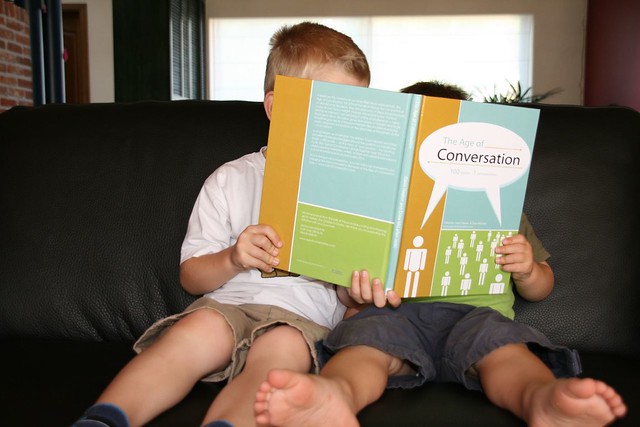 |
Last
week in Brazil I met Bob Boiko, who gave a very interesting presentation on
information management and the role of social media. His point was that social media is all about
electronic conversations of various types – all of them about publishing, but
many of them allowing a level of response or reaction.
Conversation is very important within knowledge management, particularly when it is the
right sort of conversation.
Conversations come in various types –assertions, gossip, argument,
debate, telling jokes – but this only really one type of conversation at
effectively transfer is knowledge, and that is dialogue. Very few of the common social media allow effective
dialogue, even the discussion forums you find on LinkedIn, and listening to Bob
I began to wonder what sort of typical conversations the common social media
generate, and the following caricatures popped into my mind.
- Facebook is like gossip at a party – rapidly changing social conversations within groups of friends
- Twitter is like shouting sound bites into an echo chamber – the good ones or the interesting ones echo longer than the others
- Linked-In conversations, when they are good, are debate or question-and-answer, at their worst they serial assertion, sometimes escalating into serial disagreement.
- Blogging is like Speaker’s Corner at Hyde Park – monologue with heckling
- Wikipedia at its best is like a TV debate panel correcting each other, at its worst is a TV debate panel arguing with each other.
- I don’t have a caricature yet for Google+ as I haven’t been on there for long enough




1 comment:
I have to disagree with you on this one.
Each social media tool and its network are different with different pros and cons but I have personally found them useful for knowledge management as I know have others.
Twitter, the tool I use most has at least three uses in KM which are mutually reinforcing:
1. Network building - it's possible to find, engage with and sometimes build relationships with people through twitter who share common interests or challenges with whom you might not otherwise have been in contact with or even aware of. This network can be extremely helpful when you are looking for information, advice, feedback or collaboration.
2. Information sharing - Twitter is a great research tool both for actively seeking information whether to get tech support, to know what the latest research/thinking is or to find out who is working on something. This information sharing can be done actively by asking a question, or passive - finding out about things from your network that then set off new ideas or can be used later.
3. Dialogue. There is real dialogue on twitter whether its structured dialogue such as a scheduled tweetchat or a conference backchannel, or spontaneous such as when some article or statement sparks of a conversation. I've changed my views or seen a new angle to something I was working on several times as a result of this type of exchange.
It's worth noting that a dialogue started on social media can be made deeper by moving it to a discussion forum, a phone call, e-mail exchange webinar or even better a face to face. BUT the exchange might never have started, or the participants might never have even been aware of each other were it not for social media.
Post a Comment